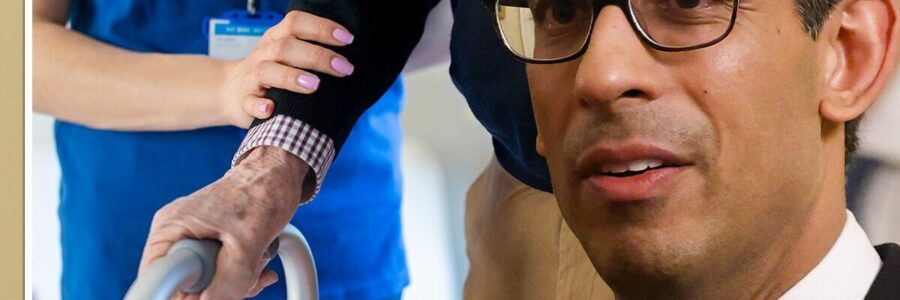
NHS crisis won’t be solved until care homes can pay better than Aldi
Autumn Statement: Jeremy Hunt outlines plans for social care
We use your sign-up to provide content in ways you’ve consented to and to improve our understanding of you. This may include adverts from us and 3rd parties based on our understanding. You can unsubscribe at any time. More info
Care workers can earn more stacking shelves in supermarkets because of a “very broken” system which has led to a chronic staff shortage. In a damning and wide-ranging interview, Professor Martin Green, the chief executive of Care England, has warned Prime Minister Rishi Sunak the NHS beds crisis cannot be fixed until there is a complete rethink on social care provision.
Care England is the charity which represents home care and nursing homes among other providers.
Prof Green has lambasted the way the care sector continues to be treated “as the Cinderella service” to the NHS and claims that all attempts to integrate the two have failed.
He told the Daily Express: “There is a crisis in social care which has produced a crisis in the NHS. I think what we have seen is successive governments over many years neglecting social care.
“As that has been happening there have been more and more people because of demographic changes who need care and support.
“Now it has all come together to the point that not only is the social care system I think very broken but it is now having this huge impact on the NHS.”
The issue of so-called “bed blocking” by elderly people unable to return home or into care because of a lack of support, has seen people having to wait for hours in ambulances to wait for a hospital bed to become free.
The problem came despite Chancellor Jeremy Hunt laying out plans for social care in his Autumn statement and Mr Sunak making halving waiting lists by freeing up hospital beds one of his gfive pledges.

A frustrated Prof Green warned that the policy of “localism” through councils needed to end and be replaced by a national one.
He said: “What I find incredible is they put £500 million into the delayed discharge process scheme.
“Well quite clearly that didn’t work as effectively as they thought it was because if they had we wouldn’t have this problem in people being effectively discharged.
“So, they then put in another slug of money in another £250 million. But they continue the same old failed policy of letting it be done locally. Who is driving this in Whitehall?”
At the heart of the problems are an inability for the sector to recruit.
Prof Green said that a “lack of preparation” over Brexit had helped fuel the problem because potential staff were no longer coming from the EU.
He said: “But actually it is a very difficult process to recruit from overseas.
“In fact, it September, the government promised they would put £15 million into a fund to increase international recruitment of care worker. That was September 2022, and that money still hasn’t reached us yet.
“We don’t know where that money has gone. It was part of our plan for patients but it just hasn’t materialised.”

But worse was the decision by the government to ban unvaccinated people working in the care sector which led to 30,000 people leaving.
“What the government tends to do is instead of making decisions for the whole system, they make decisions for bits of it which then have knock on consequences.
“What they did was they went and got jobs in the NHS or in home care where it wasn’t a requirement to be vaccinated.
“I still do not understand why if it was a requirement in a care home, why wouldn’t it be a requirement in a hospital?
“It’s no longer a requirement but the problem was that when it was the damage was done and we lost those 30,000 people.
DON’T MISS
Speculation Boris could switch London constituency for new safe seat [REVEAL]
Even Inspector Clouseau would see what Pink Panther fan Boris is up to [INSIGHT]
POLL – Do you support Liz Truss making a political comeback? [REACT]

“The government has caused these problems but when they back away from them and say ‘well now it is not a problem’, well it is still a problem because we lost 30,000 people which we haven’t replaced.”
Prof Green also highlighted how the care sector is unable to compete with supermarkets like Aldi and Tesco who can pay people more for stacking shelves because of the way the funding formula restricts wages for care providers.
He said: “People can earn more stacking shelves in Aldi or Tesco. This is part of the problem.
“Working in social care is an incredibly skilled and difficult role and yet we are not paying people the amounts of money they should be paid for doing such a skilled and difficult role.
“It is not only emotionally draining but it is also very physically demanding.
“If I could go and stack shelves in Aldi, what I would know is at the end of my shift I could walk away and go home and have no stress.
“I wouldn’t be worrying whether Mrs Jones died in the night or what is going to happen I have left and I know is very ill.”
But he also believes that the other major problem is that the system “obsesses over processes not outcomes”.

In particular, home care providers are paid by the minute rather than a successful outcome.
“For example, if you look at the way they commission social care it might be you go into Mrs Jones home, you make her a slice of toast, you get her out of bed, you wash her and you dress her and you are supposed to do that in 30 minutes.
“It’s really interesting I had an old lady I was talking to about it and she said to me ‘how long does it take for you to get ready in the morning?’
“And I said, ‘about an hour.’ She said, ‘exactly and you haven’t had a stroke!’
“The rhetoric is about how you enable people to be as independent as possible.
Well, this lady said to me ‘I probably could get my stockings on but it would take me about 30 minutes.’ And you have got 30 minutes to do everything.”
“She said ‘what they have to do is they have to put my stockings on for me.’”

He added that she found the experience just “reinforced her disability.”
But he also warned that attempts at integration between the care sector and NHS had often just involved changing the structure, the office and the headed paper but “they don’t change the people or the culture and they get the same outcome.”
The same staff are “recycled” and “nothing changes.”
“If you ran a business and you were constantly changing the way you delivered that business and you were constantly failing you would say to yourself, it’s obviously not structural, it’s cultural or it is something about the way in which we deliver this business.”
He added: “I am so old I can remember co-terminosity, joint appointments, colocation, PCTs, CCGs, I know about health and wellbeing boards. Now we have got integrated care systems.
“Part of me is so irritated because these are not difficult and complex things. These are things which just require people t think about the outcomes and work backwards from there.”
Source: Read Full Article